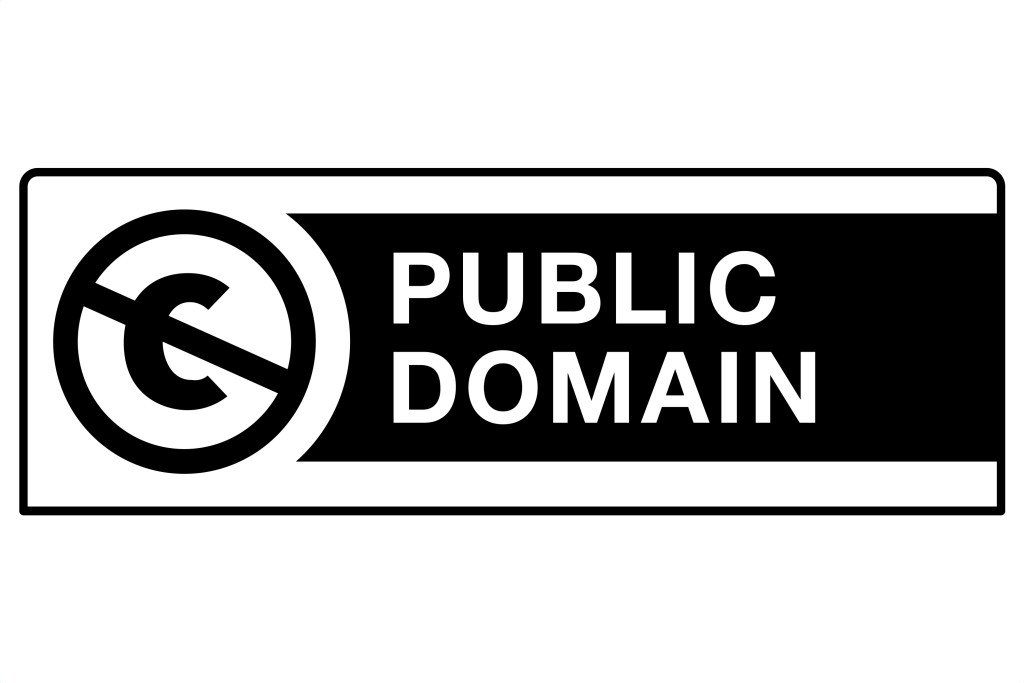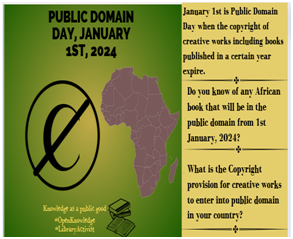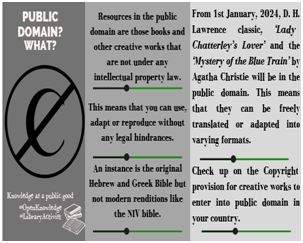
A little bit before 2023 ended, I had asked a question in the Nigeria Wikimedia User Group about the public domain concept in the copyright laws of African countries. The public domain principle promotes the notion of knowledge as a public good meant for all to access and build on for a better society.
I had no idea that my dear country Nigeria, has the provision tucked in within the law but it is not mentioned as is done in the Copyright law of Ghana.
This rankled.


Knowledge as a public good
Explicit mention of the term within the copyright law will give it a name and make it more noticeable and ‘knowable’. It will also highlight the point that knowledge as a public good is enshrined within the law. Paul Samuelson’s Pure Theory of Public Expenditure (1954) postulated that public goods are necessary to keep the society functional, and progressive in an orderly manner. He also ascribed two principal characteristics to public goods.
First, there must be non-rivalry of consumption (when one person consumes the goods, it does not hinder another person from doing so and the good does not disappear because another person used it). Second, for a resource to be a public good, there must be non-excludability of consumption (it is accessible to all. No one is excluded from using it). Knowledge fulfills these criteria.
That person A has the knowledge about a concept or a process does not stop person B from gaining the same knowledge. Also, once knowledge is open and out there, no one can be excluded from acquiring it. Inequalities are created through hindering or blocking access to knowledge and this happens when the resource is seem as an exclusive good that should be available to some and not to all.
Beyond that, knowledge is critical for development and sustenance of human life at all levels. Research findings, learning and innovations drive civilization. Knowledge has become the mainstay of all sectors of human development as it is a major factor that guides decisions and builds the capacity for actions in modern times. The internet and the ever evolving digital technologies have made knowledge to become essential to life as is the air we all breathe. It therefore follows that knowledge generation, dissemination and accessibility should not only be available for individuals, organizations and communities that can afford it. As much as is feasible, knowledge should be a public good, a resource that is available for all, that bridges the existing inequalities and ensures that ‘no one is left behind’.
Copyright laws safeguard authors and other creators so that knowledge is first a private right then a public good second. However, the argument is that naming the public domain concept openly in Copyright laws will signify non-resistance to opening and sharing knowledge for common good as well as the maintenance of a proper balance between the private and public gains of knowledge. This is important because the underlying principle of open knowledge or open licensing or knowledge as a public good should not be alien concepts to copyright provisions within some countries in the continent. Stakeholders especially authors and creators should be made to feel comfortable around the idea that open knowledge is a pathway they can tow in releasing their works.
Why the public domain principle is important
Knowledge is a critical building block for creativity and development especially where there are opportunities for re-use, reinterpretation and reproduction as this engenders new ideas. The practice gives authors and creators of knowledge and art in different formats as well as their off-springs sufficient time to benefit from their intellectual property first before the resources become ‘free’ to adapt, reuse, translate without asking for permissions from the copyright holders. Open knowledge enthusiasts see the principle as a means of opening up knowledge for the greater good of the society as all knowledge is interconnected and creativity inspires more creativity. They understand the importance of embedding the public domain concept in copyright laws as this enables knowledge resources and art works in different formats to become unbound from copyright limitations after several decades, depending on the country.
Thus, this enables anyone to freely use the resources, remix, reuse, adapt, translate or remake into a new format to make them more available to others. That is why 2024 Public Domain day was somewhat loud as Mickey Mouse, along with Minnie, somewhat came into the public domain.
Why it is important for Wikimedia communities
There is need for African editors to better understand copyright policies that impact what they can and can’t do on Wiki projects as policies that guide access to knowledge are the guideposts that can prove to be challenges in opening up knowledge. For example, the public domain principle enshrined in Copyright laws can be further explored by Wiki editors in Africa to know what books and other resources will be freely available for use and reuse and when this would happen. Furthermore, the understanding about Wiki projects will grow within the African continent when there is more awareness about knowledge as a public good that all can access.
What can we do?
Wikimedia User Groups could run trainings within their different communities to assist volunteers see the larger picture of what they do within the frameworks of making knowledge a public good which can drive good governance, equity and sustainable development within and beyond their communities. This will ingrain the understanding of why opening up knowledge is important. They could also be led to see themselves as open knowledge advocates or at least enthusiasts who make knowledge openly available for humane and altruistic purposes and why being a Wikimedian means identifying with a philosophy that highlights ‘open’ as a principal pathway for societal equity among other things!
User Groups could also run targeted awareness creation and advocacy in the right places that will go beyond the present Wikimedia communities to stakeholders who should ‘recognize’ the Wikimedia movement as a voice that needs to be heard when Copyright issues are discussed in different African countries.
Also, it is important that Wikimedia volunteers in Africa understand and drive the fact that there are two sides of a coin for knowledge creation and dissemination. On one side, knowledge could be created and disseminated for pecuniary purposes with full copyright provisions in place as stipulated in the law. On the other side, knowledge could be recognized as a public resource and/or a good that can also be created and shared for altruistic purposes as upheld through the public domain principle also in the copyright laws. Ensuring that this side of the coin is robustly presented in the Copyright law within the the different countries of African continent is a task for Wiki African editors.

Can you help us translate this article?
In order for this article to reach as many people as possible we would like your help. Can you translate this article to get the message out?
Start translation